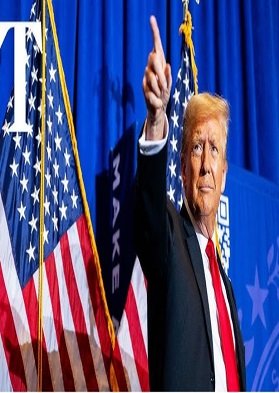In recent years, the political landscape has witnessed sharp polarization, and commentary on leadership has flourished as an essential lens through which we understand these divisions. Dale Ruff, a regular contributor to OpEdNews, has carved out a space for himself as a thoughtful voice, dissecting leadership decisions, societal impacts, and the broader implications of governance. Dale Ruff, OpEdNews Trump: A Closer Look at Perspectives on Leadership and Policy, frequently explores the controversial tenure of former President Donald Trump, delving into the policies, rhetoric, and cultural shifts that defined his presidency.
Ruff’s insights on Trump focus on the intersection of political ideology, governance, and social transformation, particularly in the context of.
Understanding Dale Ruff’s Perspective
Ruff’s analysis often bridges the gap between academic critique and grassroots observations. By targeting Trump’s leadership style, he sheds light on themes that resonate deeply with citizens, such as economic inequality, climate change, and democratic accountability, making his work highly relevant and engaging.
For Ruff, the Trump era was marked by a stark departure from traditional political norms. His writings repeatedly highlight how these disruptions were not merely stylistic but structural, challenging long-held principles in governance. By examining this shift, Ruff raises crucial questions: What happens when the lines between personal ambition and public service blur? How does this influence policymaking?
Critical Themes in Ruff’s Writings
- Economic Disparities and Wealth Concentration
A recurring theme in Ruff’s OpEdNews articles is the economic impact of Trump-era policies. He critiques tax reforms that he argues disproportionately benefited the wealthy while exacerbating income inequality.
Ruff illustrates how policies that claim to support middle-class Americans have unintended—or intended—consequences that reinforce systemic inequities. For instance, his critiques of deregulation emphasize the long-term risks these decisions pose to economic stability and environmental sustainability.
- The Erosion of Democratic Norms
Ruff is particularly vocal about the challenges to democratic processes during the Trump administration. From questions surrounding election integrity to the concentration of executive power, his articles scrutinize how these actions resonate beyond the United States, influencing global democratic trends.
He connects these developments to a more significant cultural shift, where misinformation, tribalism, and media manipulation threaten the foundational ideals of democracy. By highlighting these trends, Ruff calls readers to consider their role in preserving accountability and transparency.
- Climate Change and Environmental Policies
Trump’s withdrawal from the Paris Agreement and the rollback of numerous environmental protections are central to Ruff’s ecological critique. He outlines how such actions undermine global efforts to combat climate change, framing them as a broader neglect of long-term priorities for short-term gains.
Ruff’s perspective isn’t just rooted in critique; he calls for actionable solutions, urging citizens and policymakers alike to adopt forward-thinking approaches to address environmental challenges.
Trump’s Rhetoric: A Double-Edged Sword
Another critical focus of Ruff’s analysis is the power of Trump’s communication style. While acknowledging its effectiveness in rallying supporters, Ruff warns of the dangers inherent in inflammatory and divisive rhetoric. He draws attention to moments such language exacerbated tensions, contributing to a more fractured national identity.
Ruff’s writings suggest that rhetoric is not just words—it’s a governance tool. Leaders set the tone for public discourse, and Trump’s approach, he argues, prioritized conflict over unity.
Lessons for Future Leadership
Ruff’s commentary often moves beyond critique to offer a roadmap for improving governance. Drawing from the Trump era, he advocates for:
- Enhanced Civic Engagement
- Encouraging active participation in democratic processes, Ruff underscores the importance of an informed electorate. He emphasizes the need for education systems to prioritize critical thinking and media literacy to counter the spread of misinformation.
- Policy Over Personality
- A consistent thread in Ruff’s writings is the need to focus on policies rather than personalities. He calls for evaluating leaders based on measurable outcomes rather than charisma or rhetoric.
- Global Cooperation
- In light of Trump’s often unilateral approach to international relations, Ruff stresses the importance of collaboration in addressing shared challenges, from pandemics to climate change.
Navigating a Post-Trump Era
Ruff’s insights remain deeply relevant as the United States moves beyond the Trump presidency. His analysis serves as a reminder that leadership is not an isolated act but a collective experience shaped by decisions, discourse, and their ripple effects.
Ruff challenges readers to consider their role in shaping the future. Whether through voting, advocacy, or grassroots action, his writings underscore the power of collective agency in holding leaders accountable and fostering a more equitable society.
Conclusion: The Lasting Impact of Dale Ruff’s Work
Dale Ruff’s contributions to OpEdNews provide a nuanced, multifaceted exploration of Trump’s presidency. By combining critical analysis with actionable insights, Ruff offers readers a framework to understand the complexities of leadership and governance better.
His work is a testament to the importance of engaged, informed commentary in navigating the challenges of our times. As political landscapes evolve, voices like Ruff’s play a vital role in fostering accountability, transparency, and progress.
By reflecting on the themes and critiques presented by Ruff, readers are better equipped to engage with today’s pressing issues and advocate for a future rooted in justice and integrity.
Subscribe to our email newsletter to get the latest posts delivered right to your email.


Hi, this is a comment.
To get started with moderating, editing, and deleting comments, please visit the Comments screen in the dashboard.
Commenter avatars come from Gravatar.